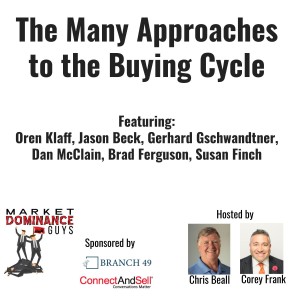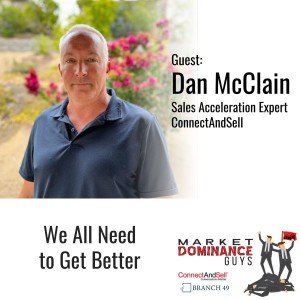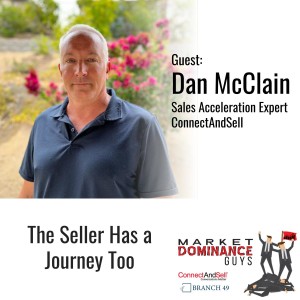Market Dominance Guys
Guest: Dan McClain
Episodes

Wednesday Aug 17, 2022
EP144: The Many Approaches to the Buying Cycle
Wednesday Aug 17, 2022
Wednesday Aug 17, 2022
These sales experts agree, that there is more than one approach to a successful sales campaign. We're sure Chris Beall has some dark childhood story about alternate ways of skinning a cat, although he's never done it, of course. These discussions include modifications and redirections in the buying cycle, even though the basics are still there: awareness, consideration and decision. Join Corey and Chris in this episode of snippets from episodes about the buying cycle. This features Oren Klaff, Jason Beck, Gerhard Gschwandtner, Susan Finch, Dan McClain, Brad Ferguson, and our own Chris Beall and Corey Frank. To hear the entire episodes features, visit this collection:
https://marketdominanceguys.com/category/buying-cycle/

Tuesday May 24, 2022
EP133: We All Need to Get Better
Tuesday May 24, 2022
Tuesday May 24, 2022
How often do salespeople need to be trained? Most people would say, “Once during onboarding should do it.” “Not so,” says Dan McClain, Sales Director at ConnectAndSell. As today’s guest on Market Dominance Guys, Dan talks with our host, Chris Beall, about the importance of periodically sharpening sales reps’ skills. In this second of their two-part conversation, these two sales guys, both amateur chefs, agree that knives work better when they’ve recently been sharpened — and sales reps work better when their selling skills have recently been sharpened. Dan reminds our podcast audience that, over time, all sales reps drift from their company’s established message, their pace may become rushed, or their tone lackluster. For these very reasons, ConnectAndSell’s own reps go through a periodic blitz-and-coach cold-calling session, an essential tool of ConnectAndSell’s Flight School, because, as Dan says, “We all need to get better.” And because this essential advice bears repeating, that’s what we’ve named today’s Market Dominance Guys’ episode: “We All Need to Get Better.”
About Our GuestDan McClain is Sales Director at ConnectAndSell. His life-long dedication to sales has led him to his current goal: helping sales leaders, teams, and individuals connect with their targets at a velocity of 10X by using ConnectAndSell Lightning. Dan is based in the San Diego area and is active in his local chapter of AA-ISP.

Tuesday May 17, 2022
EP132: The Seller Has a Journey Too
Tuesday May 17, 2022
Tuesday May 17, 2022
You’re no doubt familiar with the buyer’s journey, but what do you know about the seller’s journey? Dan McClain, Sales Director at ConnectAndSell and today’s guest on Market Dominance Guys, shares his personal journey as a salesperson with our host Chris Beall in this first of a two-part conversation. Starting at the beginning of his career, Dan tells the story of how he got into sales straight out of college, what his early selling experiences were like, and how he cold-called his way to where he is today. Most memorable for him was his first experience using ConnectAndSell Lightning, the cold-calling tool that boosts the number of conversations a salesperson can have with prospects. Pushing that “Go” button and being served one conversation after another changed his life and led to his current job selling Lightning at ConnectAndSell. Helping other salespeople discover this tool is now Dan’s mission. Listen in as Dan and Chris remember the details of their first meeting in today’s Market Dominance Guys’ episode, “The Seller Has a Journey Too.”
About Our Guest
Dan McClain is Sales Director at ConnectAndSell. His life-long dedication to sales has led him to his current goal: helping sales leaders, teams, and individuals connect with their targets at a velocity of 10X by using ConnectAndSell Lightning. Dan is based in the San Diego area and is active in his local chapter of AA-ISP.